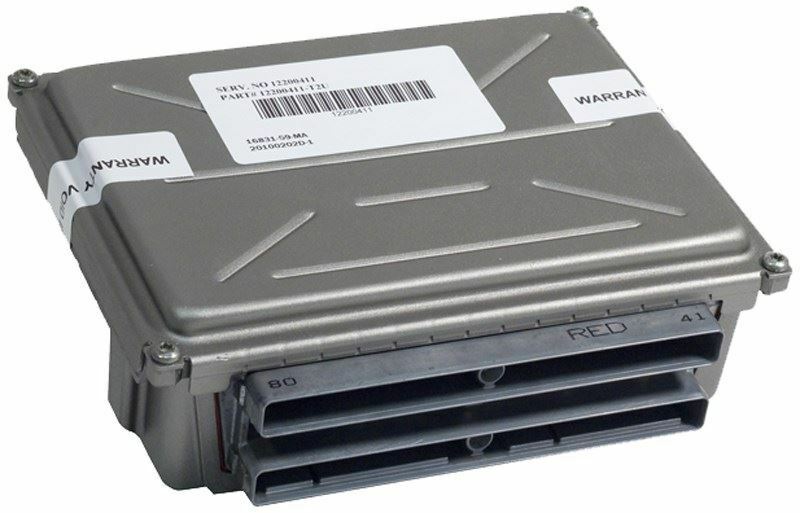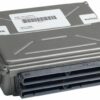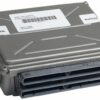Is Your Oldsmobile Alero Running Rough? The PCM Might Be the Culprit.
If you’re dealing with a persistent check engine light, erratic engine performance, or mysterious stalling in your 1999 Oldsmobile Alero or a similar GM vehicle, the Powertrain Control Module (PCM) is a likely suspect. As the central computer for your engine and transmission, a failing PCM can cause a cascade of frustrating and difficult-to-diagnose issues. This replacement Powertrain Control Module, part number 9357034, is the definitive solution to restore your vehicle’s performance, reliability, and drivability.
Unlike a generic part from a local store, this module is not a simple one-size-fits-all solution. We provide a crucial service: we flash the module with the latest GM-certified software specifically matched to your vehicle’s unique Vehicle Identification Number (VIN). This ensures perfect compatibility with your engine, transmission, and all factory-installed options, making the installation process as smooth as possible.
From the Diagnostic Bay
I once had a 1999 Pontiac Grand Am (which uses this exact same PCM) come into the shop with the most frustrating intermittent stalling issue. The owner had been to three other shops. It would drive perfectly for 20-30 minutes, then suddenly die at a stoplight. No codes, no warning. We checked fuel pressure, ignition components, sensors—everything tested fine. On a hunch, with the car idling in the bay, I carefully used a heat gun to warm up the PCM. Within five minutes, the engine sputtered and died. As it cooled, it would start right back up. It was a classic case of internal thermal failure on the circuit board, something a simple code scanner would never catch. Replacing the PCM with a properly programmed unit solved a problem that had plagued the owner for months.
Symptoms of a Failing Powertrain Control Module
A faulty PCM can manifest in various ways. If your vehicle is experiencing any of the following, it’s time to consider a replacement:
- ✔ Persistent Check Engine Light: Especially with internal processor fault codes (like P0601, P0602, P0605) or communication errors.
- ✔ Engine Stalling or Misfiring: Unpredictable stalling, rough idling, or misfires that don’t seem related to spark plugs or coils.
- ✔ No-Start Condition: The engine cranks but refuses to start, often due to the PCM not firing the fuel injectors or ignition coils.
- ✔ Poor Fuel Economy: A failing module can’t properly calculate the air-fuel mixture, leading to a noticeable drop in MPG.
- ✔ Harsh or Erratic Shifting: The PCM also controls the automatic transmission, and a fault can cause jerky shifts or failure to shift into certain gears.
- ✔ Failed Emissions Test: Incorrect engine management will almost certainly lead to a failed smog check.
The Right Solution: A Programmed 1999 Alero PCM
Choosing the right replacement is critical. Our process ensures you get a module that works correctly right out of the box. When you order this 1999 Alero PCM, we don’t just ship you a part; we provide a comprehensive service. By programming the unit with your vehicle’s VIN, we load the correct software and calibrations that GM designed for your car. This process accounts for engine size (3.4L V6), transmission type, and even the original tire size, ensuring all systems operate in harmony.
This module is a direct replacement for a wide range of GM vehicles from the late 1990s, including the Pontiac Grand Am, Buick Century, Chevrolet Malibu, and more. It is compatible with multiple service numbers, including 09356741, 16236757, 9356741, and 9357034. Providing your VIN is the only way to guarantee you receive the correctly configured part for your specific application.
Installation and Post-Installation Requirements
Physical installation is straightforward for a DIY mechanic. The module is typically located in the engine bay or under the dashboard. After disconnecting the battery, you simply unbolt the old unit, disconnect the wiring harnesses, and install the new one. However, after installation, a ‘Security Relearn’ or ‘CASE Relearn’ procedure is often required. This is a simple process that syncs the new PCM with your vehicle’s anti-theft system and crankshaft position sensor. This procedure can typically be done without special tools and involves a series of key cycles. Instructions are widely available online for your specific model.
Frequently Asked Questions
What is a PCM and what does it do?
The Powertrain Control Module (PCM) is your car’s main computer. It controls all aspects of engine and transmission function, including fuel injection, spark timing, emissions systems, and automatic transmission shifting, to ensure optimal performance and efficiency.
Why do you need my VIN?
Your Vehicle Identification Number (VIN) contains critical information about your car’s specific build, including engine size, transmission type, and emissions equipment. We use the VIN to load the exact GM software and calibrations your vehicle requires, ensuring a perfect match and proper function.
Is this part difficult to install?
The physical replacement is generally simple, requiring basic hand tools to disconnect and reconnect the module and its wiring harnesses. The most important step is performing the security relearn procedure after installation, which can be done at home.
Will this fix my check engine light?
If the check engine light is caused by an internal failure of the original PCM (common codes include P0601-P0606), then this replacement module will solve the problem. It’s always best to have the codes professionally diagnosed to rule out other issues like faulty sensors or wiring.
What does ‘flashing’ or ‘programming’ mean?
‘Flashing’ or ‘programming’ is the process of loading vehicle-specific software onto the module. We install the latest updates from GM, which can often correct factory drivability issues, ensuring your replacement PCM performs better than the original ever did.
Is this compatible with my 1998 Grand Prix?
Yes, this module is compatible with a wide range of 1998 and 1999 GM vehicles as listed in the fitment data. The key is to match the service number on your original part or provide us with your VIN to confirm perfect compatibility.


